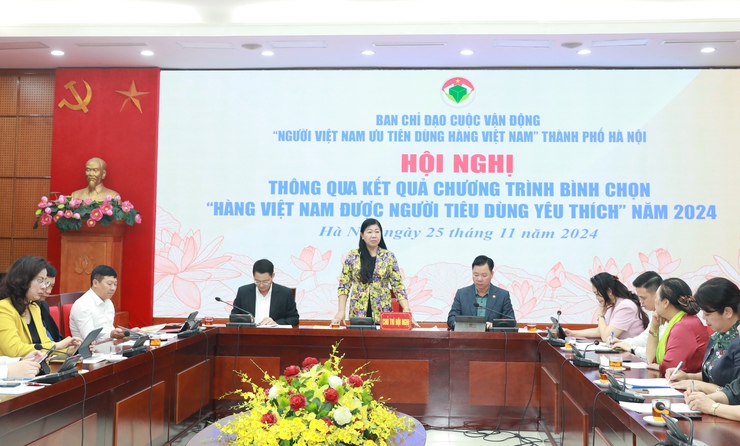The Steering Committee for the campaign "Vietnamese People Prioritize Using Vietnamese Goods" in Hanoi on November 25 held a conference to review the results of the 2024 program for selecting "Vietnamese Goods Favored by Consumers."
According to the report on the results of the "Vietnamese Goods Favored by Consumers" program in 2024, the Department of Industry and Trade stated that as of October 15, the organizing committee received nearly 200 applications from businesses. Among these, 142 businesses with 276 products and services qualified for participation, representing an 84% increase in eligible products and services compared to 2023.

Chairwoman of the Hanoi Fatherland Front Committee Nguyen Lan Huong speaks at the event.
During the voting process, from October 1 to October 31, 2024, online voting featured 18 categories of products and services on the program's website, with 304,816 votes recorded, an increase of 5.55% compared to 2023. Meanwhile, direct voting at public locations in October 2024 accounted for 231,113 votes, a rise of 5.05% from 2023. Combining both online and offline results, the program garnered a total of 535,929 votes, marking a 5.33% increase from 2023, which saw 508,786 votes.
Based on consumer voting results and the evaluation and scoring by the jury, the organizing committee identified 150 products from 142 businesses, divided into four tiers based on scores from highest to lowest. Tier 1 included 25 products and services from 23 businesses, Tier 2 featured 35 products and services from 33 businesses, Tier 3 had 40 products and services from 37 businesses, and Tier 4 included 50 products and services from 49 businesses.
The "Vietnamese Goods Favored by Consumers" recognition ceremony for 2024 is scheduled to take place at 7:30 PM on November 28, 2024, at Trinh Cong Son Pedestrian Street, Tay Ho District.
Speaking at the conference, Chairwoman of the Hanoi Fatherland Front Committee Nguyen Lan Huong commended the program's results, highlighting the diverse promotional activities and the wide-reaching, innovative voting formats that attracted substantial public participation. The increased number of participating businesses and votes reflects the efforts of the steering committee, especially the significant role of the Department of Industry and Trade.
However, Huong noted certain limitations, particularly in promotional activities that fell short of achieving the desired impact. Furthermore, the participation rate of businesses and products in the program remained low, with many of Hanoi's key products absent.
Hanoi has over 1,000 OCOP-certified products, yet only 23 participated in the program. Most of the participating items were traditional goods, with minimal representation from sectors such as finance, banking, and digital transformation.
Huong called on the organizing committee, departments, and organizations to assume greater responsibility and clearly define their roles to increase the participation of innovative, high-tech products, ensuring alignment with the city's development.
Huong urged agencies to proactively identify and invite businesses offering high-quality new products to join, thereby enhancing the promotion of high-quality Vietnamese goods. She also supported the proposal to include additional exhibition booths at the recognition ceremony. Looking forward to 2025, marking 15 years since the program's inception, she suggested honoring businesses and products that have participated consistently throughout the program to acknowledge their commitment and contributions.